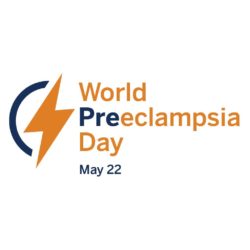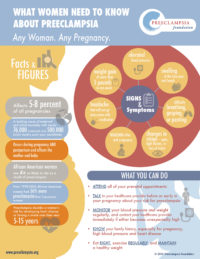May 22 is recognized as World Preeclampsia Day. Occurring in only 5-8% of pregnancies, preeclampsia isn’t a complication typically on the mind of a newly pregnant mom. Yet, for those it strikes it can be life changing and even deadly. I am a survivor. A survivor of this often unheard of, yet potentially deadly, pregnancy complication.

Find out more at endingeclampsia.org
Typically occurring after 20 weeks gestation, and usually more near the end of pregnancy, preeclampsia can also occur for up to six weeks after delivery. The most common signs are high blood pressure and protein in the urine, yet it can occur with no symptoms or present with swelling, rapid weight gain, headaches and even vision changes.
For me, signs began to show at 18 weeks with high blood pressure. As the weeks unfolded we learned I was one of the rarer cases – a pregnancy complicated by preeclampsia during the second trimester. That means we were in the 3% of the 5-8% affected by the disease.
If left untreated preeclampsia can progress into eclampsia and HELLP Syndrome. Eclampsia is a severe complication in which seizures occur, and HELLP Syndrome involves rapidly falling platelet counts and issues with the liver.
There is no cure for preeclampsia, eclampsia or HELLP other than delivery. For us, that meant delivery at 27 weeks and 6 days. Our daughter was growth restricted and had limited blood flow due to the failing placenta from high blood pressure and other complications related to the disease, leaving her at 1 pound, 15 ounces, extremely small for her gestation.
My daughter and I are survivors. We sought prenatal care and were closely watched as symptoms and weeks unfolded. All pregnant women should know the signs of preeclampsia. A severe headache during pregnancy should always be checked, as it can be a sign of high blood pressure. Routine prenatal appointments check for protein in the urine, and extreme weight gain, so symptoms can be managed and watched.
There’s no predictor of who will and who won’t get preeclampsia. Yet, there are risk factors: chronic hypertension, first pregnancy, age, obesity, different father than previous pregnancies, multiples and even IVF all can increase your chances. For us, it was our first pregnancy. I was in perfect health having run a half marathon just days before we conceived and yet, this is our story. It can happen to anyone during any pregnancy – risk factors or not.
I hope that my daughter and I one day see a cure, but until then we will continue to share our story and raise awareness in hopes that another mom and baby can be helped through it.
Today we recognize World Preeclampsia Day for all the survivors and those who were taken too soon by this pregnancy complication. If you are a survivor, we highly encourage you to share your story with others. Help to raise aware of this pregnancy complication that can be deadly. Consider joining the Preeclampsia Registry at: https://www.preeclampsiaregistry.org/. Without survivors willing to share their information, there is no way for research to occur.

